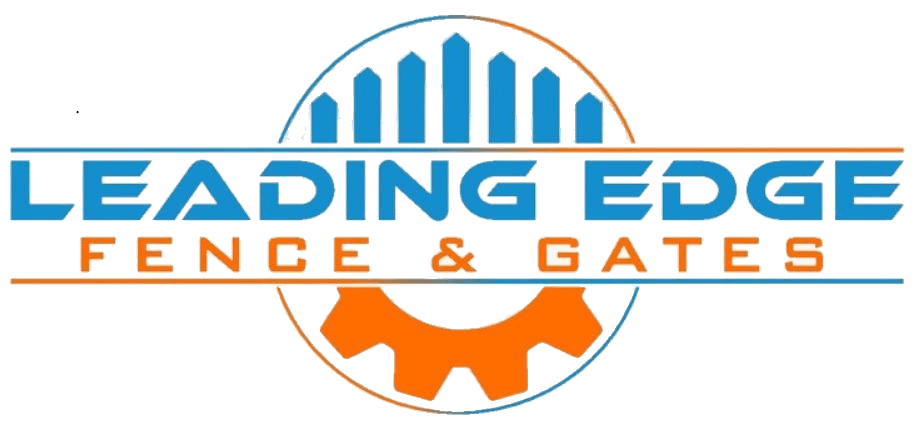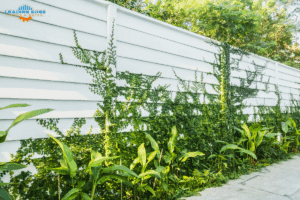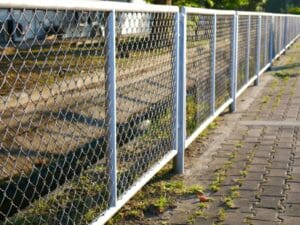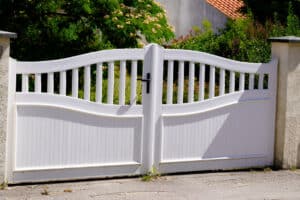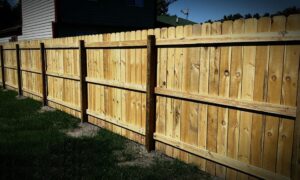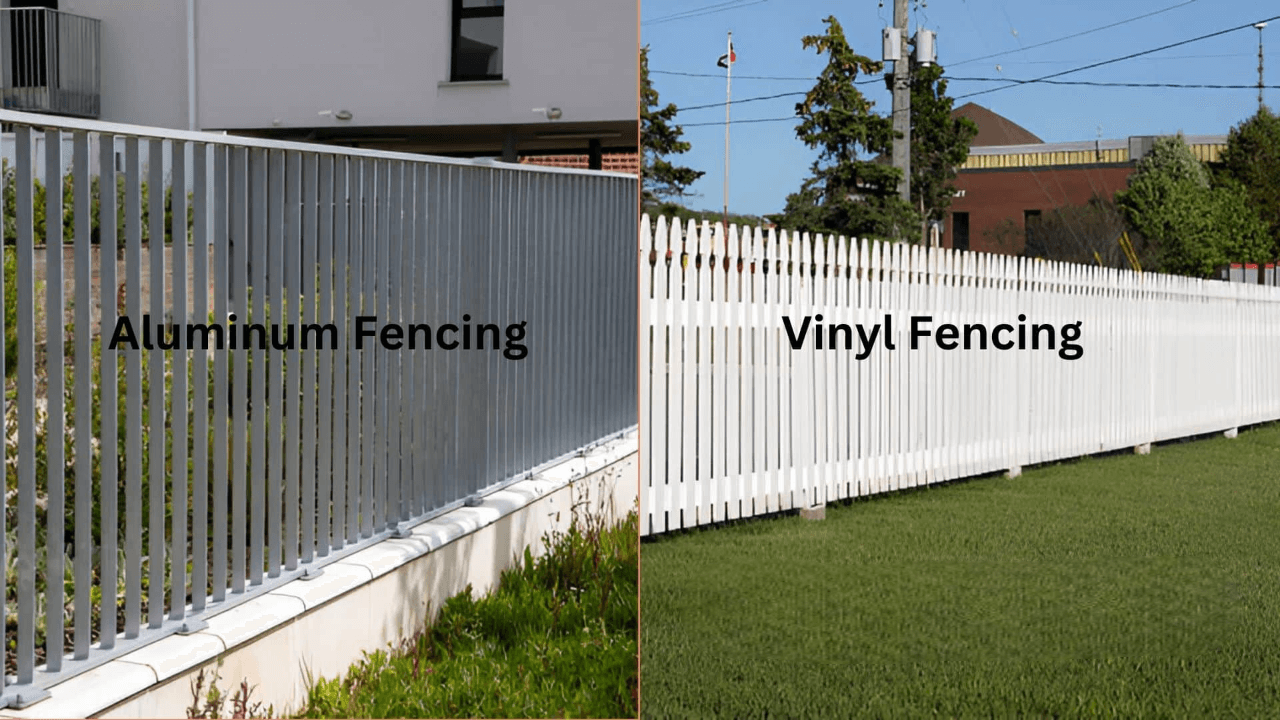
- by FDM Team
Enhancing your property’s security and aesthetics requires choosing the right fencing material. Aluminum and vinyl fencing are popular choices for homeowners. At Leading Edge Fence & Gates, we understand the importance of selecting the perfect fence for your needs. This blog post will explore the characteristics, pros, and cons of both aluminum and vinyl fencing to help you make an informed decision.
Understanding Aluminum Fencing
Characteristics of aluminum fencing:
Aluminum fencing is known for its sleek, modern appearance and durability. It’s lightweight yet strong, making it an excellent choice for various property types. Aluminum fences are often powder-coated, enhancing their resistance to weather and corrosion.
Pros of aluminum fencing:
- Low maintenance requirements: Aluminum fences do not require painting or staining, and they resist rust and corrosion.
- Rust-resistant and weather-resistant: Aluminum’s natural resistance to rust and weather damage makes it ideal for various climates.
- Versatile design options: Available in a range of styles, colors, and heights, aluminum fencing can be customized to suit different aesthetic preferences.
- Easy installation: Aluminum fencing is relatively easy to install, often coming in pre-assembled panels.
- Environmentally friendly (recyclable material): Aluminum is a recyclable material, making it an eco-friendly choice.
Cons of aluminum fencing:
- Can be more expensive than some other fencing options: The initial cost of aluminum fencing can be higher compared to materials like wood or chain-link.
- May not provide as much privacy as solid fencing materials: Aluminum fences typically have gaps between the pickets.
- Potential for denting or bending with significant impact: While durable, aluminum can be susceptible to dents or bends if struck with enough force.
Exploring Vinyl Fencing
Features of vinyl fencing:
Vinyl fencing is made from PVC (polyvinyl chloride) and is known for its durability and low maintenance requirements. Vinyl fences are designed to withstand the elements and maintain their appearance without regular upkeep.
Advantages of vinyl fencing:
- Extremely low maintenance: Vinyl fences do not require painting, staining, or sealing, and they are easy to clean with just soap and water.
- Available in various styles and colors: Vinyl fencing comes in a wide range of designs, from privacy fences to picket fences.
- Resistant to rot, decay, and insect damage: Unlike wood, vinyl is impervious to rot, decay, and insect infestations.
- Does not require painting or staining: The color of vinyl fencing is integrated into the material.
- Long-lasting and durable: Vinyl fencing is designed to withstand harsh weather conditions.
Disadvantages of vinyl fencing:
- Can be more expensive upfront compared to some other materials: The initial cost of vinyl fencing can be higher than materials like wood or chain-link.
- Limited color options once installed: While vinyl comes in various colors, once installed, the color cannot be changed without replacing the fence.
- May become brittle in extremely cold temperatures: In very cold climates, vinyl can become brittle and more susceptible to cracking.
- Potential for fading or discoloration over time: Prolonged exposure to sunlight can cause some vinyl fences to fade or discolor.
Comparing Aluminum and Vinyl Fencing
Durability and longevity:
Both aluminum and vinyl fencing are known for their durability. Aluminum is resistant to rust and corrosion, while vinyl is impervious to rot and insect damage. With proper care, both materials can last for decades.
Maintenance requirements:
Aluminum fencing requires minimal maintenance, typically needing only occasional cleaning with soap and water. Vinyl fencing is even more low-maintenance, often requiring just a simple rinse with a hose.
Aesthetic appeal:
Aluminum fencing offers a classic, elegant look that complements various architectural styles. It’s available in different colors and designs, allowing for customization. Vinyl fencing provides a clean, uniform appearance and comes in various styles, from privacy fences to picket fences.
Cost considerations:
Initially, both aluminum and vinyl fencing can be more expensive than traditional wood fencing. However, their long-term durability and low maintenance requirements often make them more cost-effective over time. Aluminum tends to be slightly more expensive than vinyl, but prices can vary depending on the specific style and quality chosen.
Making the Right Choice for Your Property
Factors to consider when deciding:
- Purpose of the fence (privacy, security, decoration): Determine the primary function of your fence to help guide your decision. If privacy is a top priority, vinyl may be the better option. For security and decorative purposes, aluminum could be more suitable.
- Budget constraints: Consider your budget for both the initial installation and long-term maintenance. While both materials have higher upfront costs, their low maintenance requirements can result in savings over time.
- Desired aesthetics: Think about the look you want to achieve and how each material complements your property’s style. Aluminum offers a more traditional, elegant appearance, while vinyl provides a clean, modern look.
- Local climate and environmental conditions: Consider your local weather patterns when choosing between aluminum and vinyl. Aluminum performs well in various climates, while vinyl may be better suited for moderate temperatures.
Climate and environmental impact:
Consider your local weather patterns when choosing between aluminum and vinyl. Aluminum performs well in various climates, while vinyl may be better suited for moderate temperatures. Additionally, aluminum’s recyclability makes it an environmentally friendly choice, while vinyl’s durability reduces the need for frequent replacements.
Property style and neighborhood regulations:
Ensure that your chosen fencing material complements your home’s architecture and adheres to any homeowners’ association or local regulations. Some neighborhoods may have specific guidelines regarding fence materials, heights, and styles, so it’s important to verify these before making a decision.
Ready to explore your fencing options? Contact Leading Edge Fence & Gates today at (302) 892-2575 to discuss your project and receive expert guidance on choosing the best fencing material for your property.
